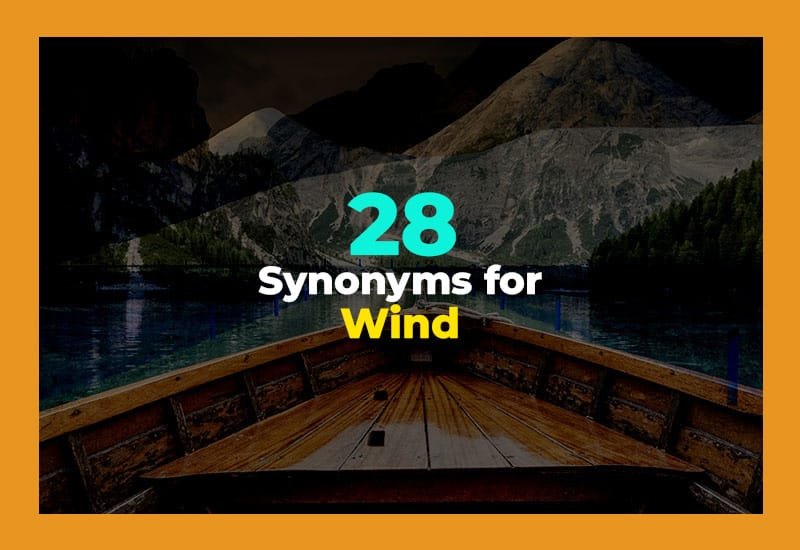Wind is an important word that we use in many ways. It can mean the air moving, a storm, or even something that changes direction. People often want other words to use instead of wind, like breeze, gust, or draft. In this article, we will explore 28 different synonyms for wind and show how to use them in sentences.
| Synonym | Meaning | Example |
|---|---|---|
| Breeze | A light and gentle wind | A cool breeze blew through the open window. |
| Gust | A sudden strong burst of wind | A gust of wind knocked over the umbrella. |
| Zephyr | A soft, gentle wind | The zephyr made the flowers sway gently. |
| Draft | A flow of air in a room | There was a cold draft coming from the door. |
| Gale | A very strong wind | The gale broke the branches off the trees. |
| Squall | A sudden violent wind with rain | The squall scared the sailors on the boat. |
| Tempest | A strong violent storm | The tempest damaged many houses in the village. |
| Whirlwind | A very fast, spinning wind | The whirlwind lifted the leaves into the air. |
| Blow | The movement of air | The wind will blow the papers off the table. |
| Current | Air moving in one direction | The current carried the kite far away. |
| Airflow | The movement of air | The airflow cooled the hot room quickly. |
| Draftiness | A place with noticeable moving air | The draftiness in the old house made her shiver. |
| Cyclone | A very strong spinning storm | The cyclone caused flooding in the town. |
| Tornado | A spinning column of air | The tornado destroyed many farms nearby. |
| Hurricane | A strong tropical storm | The hurricane forced people to leave their homes. |
| Monsoon | Seasonal heavy wind and rain | The monsoon rains flooded the streets. |
| Whiff | A small, light movement of air | I caught a whiff of fresh bread from the kitchen. |
| Puff | A short, small burst of wind | The candle went out from a puff of air. |
| Draught | A current of cool air | A cold draught came from under the door. |
| Flurry | A brief, sudden movement of wind | A flurry of leaves flew across the street. |
| Zephyrian | Related to soft and gentle wind | The zephyrian breeze made the afternoon pleasant. |
| Blast | A strong rush of wind | A blast of wind slammed the door shut. |
| Whisk | To move air quickly | He whisked the papers away with the wind. |
| Vent | A passage for air | The vent in the ceiling released the hot air. |
| Air | The moving atmosphere | The air was calm in the early morning. |
| Puffing | Blowing gently or intermittently | The chimney was puffing smoke into the sky. |
Breeze
Breeze is a very common word for wind. It is soft, light, and usually pleasant. You can feel a breeze on your face when the air moves slowly. It is often used to describe nice weather. A breeze is gentle enough that it does not cause any problems, but it can make things like leaves, flags, and clothes move a little. People often enjoy a cool breeze on a hot day.
- A gentle breeze cooled us while we were walking.
- The morning breeze made the flowers dance.
- I opened the window to let the breeze in.
Gust
Gust is a word for a strong, sudden wind. It is not slow like a breeze. Gusts can make trees shake and objects move quickly. They can sometimes be dangerous if very strong. A gust can surprise people because it comes suddenly. It is often used in weather reports to warn about sudden winds. Gust is useful when you want to describe a quick, forceful movement of air.
- A gust of wind blew my hat away.
- The window rattled with each gust.
- We had to hold onto the umbrella during the gust.
Zephyr
Zephyr is a gentle, soft wind. It is often used to describe a light, calm, and pleasant air movement. Zephyr makes the weather feel nice and comfortable. This word is also poetic and can make writing sound more beautiful. It is not strong, and it is easy to feel. Zephyr is great for describing the wind on a peaceful day.
- The zephyr moved the curtains softly.
- I enjoyed the zephyr while sitting in the garden.
- The zephyr made the river ripple gently.
Draft
Draft means a flow of air in a small space. It can be cold or warm. Draft usually happens inside buildings, coming from doors, windows, or cracks. It is useful to describe air that moves in one place, especially indoors. Drafts can make you feel chilly or cause papers to fly around.
- A draft from the window made me shiver.
- The room had a cold draft near the door.
- I felt a draft when I opened the old door.
Gale
Gale is a very strong wind. It is much stronger than a breeze or gust. Gales can break branches, move heavy objects, and even make walking difficult. It is often used in news or weather reports to describe strong outdoor winds. A gale can last for a long time or come suddenly.
- The gale broke the branches of trees.
- Walking in the gale was very hard.
- The gale blew off the roof tiles.
Squall
Squall is a sudden, strong wind, often with rain or snow. It comes quickly and can be intense. Squalls are common at sea and during storms. They can surprise people because they appear suddenly and vanish quickly. Squall is useful to describe sharp changes in weather with strong wind.
- A squall hit the small boat suddenly.
- The squall caused the sailors to grab the ropes.
- Windows shook when the squall arrived.
Tempest
Tempest is a violent storm with very strong wind. It can cause damage and danger. People use tempest to describe very intense weather, often with rain, thunder, or lightning. Tempest is a dramatic word to show that the wind is very strong and powerful. It can be used in stories or weather warnings.
- The tempest uprooted many trees.
- Boats struggled in the tempest at sea.
- Houses were damaged by the tempest.
Whirlwind
Whirlwind is a fast, spinning wind. It moves in circles and can lift small objects into the air. Whirlwinds are dangerous if strong. The word can also be used to describe quick movement in general. It shows the wind moving very quickly in a spinning motion.
- A whirlwind lifted leaves from the ground.
- The whirlwind made the garden messy.
- I watched a small whirlwind on the field.
Blow
Blow is a simple word for wind moving. It can be light or strong. Blow can also describe the action of wind on objects. It is very common and easy to use in many situations. It can describe the general movement of air in any place.
- The wind will blow the papers away.
- Leaves blow across the yard every autumn.
- The wind blew my hat off.
Current
Current means the air moving in one direction. It can be slow or fast. Current is useful when describing the flow of air in nature or indoors. It shows the movement in a clear way, like a river in the air.
- The current carried the kite far away.
- The warm current made the room cozy.
- Birds flew with the air current.
Airflow
Airflow is the movement of air in a space. It is often used in buildings, machines, or nature. Airflow helps cool or warm a place. It also moves small objects like papers or dust. Airflow is an important word for talking about how air travels in a controlled way.
- The airflow from the fan cooled the room.
- Proper airflow is important in houses.
- I felt the airflow when I opened the door.
Draftiness
Draftiness means that a place has noticeable moving air. It often feels cold or uncomfortable. Draftiness can come from windows, doors, or cracks in buildings. It is useful to describe areas where the air moves unexpectedly.
- The draftiness of the old house made me wear a sweater.
- I closed the windows to stop the draftiness.
- She noticed the draftiness near the fireplace.
Cyclone
Cyclone is a very strong, spinning storm. It can cause big damage with heavy wind and rain. Cyclones are dangerous and need warnings for safety. The word is used in weather reports and to describe extreme conditions.
- The cyclone flooded many streets.
- Homes were destroyed by the cyclone.
- The cyclone forced people to leave.
Tornado
Tornado is a spinning column of wind. It is very powerful and can lift heavy objects. Tornadoes are rare but very dangerous. People need to take shelter when a tornado comes. The word is often used in news or emergency alerts.
- The tornado destroyed the farm.
- Cars were lifted by the tornado.
- The tornado scared the whole town.
Hurricane
Hurricane is a strong tropical storm. It has heavy wind and rain. Hurricanes can last for days and cause flooding and damage. They are common in coastal areas. Hurricane is an important word for severe weather events.
- The hurricane damaged houses along the coast.
- People evacuated because of the hurricane.
- Trees fell during the hurricane.
Monsoon
Monsoon is a seasonal wind that brings heavy rain. It happens in certain parts of the world. Monsoon is important for farming but can also cause floods. It is predictable and comes at a certain time of year.
- The monsoon flooded the streets.
- Farmers were happy for the monsoon rain.
- The monsoon lasted several weeks.
Whiff
Whiff is a small, light movement of air. It is gentle and often carries smells. Whiff is a word to describe tiny changes in air. It is useful when noticing something briefly.
- I caught a whiff of fresh bread.
- A whiff of perfume passed by.
- She felt a whiff of cold air.
Puff
Puff is a short, small burst of wind. It can happen naturally or by someone blowing. Puff shows air moving quickly but lightly. It is common in daily life and often describes small actions.
- A puff of wind blew the candle out.
- I felt a puff of air from the window.
- The chimney sent out a puff of smoke.
Draught
Draught is a current of cool air. It is similar to draft but often used in older texts. Draught can make people feel cold. It is common in rooms with cracks or open doors.
- A cold draught came from the window.
- The draught made me wear a coat.
- I felt the draught in the hallway.
Flurry
Flurry is a brief, sudden movement of wind. It can lift leaves, dust, or snow. Flurry is quick and does not last long. It is often used to describe small, fast changes in air movement.
- A flurry of leaves flew across the street.
- Snow fell in a sudden flurry.
- A flurry of wind passed the garden.
Zephyrian
Zephyrian is related to soft and gentle wind. It is often used in poetry or descriptive writing. Zephyrian shows the calm, nice quality of air. It makes places feel pleasant.
- The zephyrian breeze made the afternoon nice.
- Flowers swayed in the zephyrian wind.
- The zephyrian air felt refreshing.
Blast
Blast is a strong rush of wind. It can knock things over or move objects quickly. Blast shows power in the wind. It is useful to describe sudden, forceful air movement.
- A blast of wind slammed the door.
- The blast knocked over chairs.
- I felt the blast while standing outside.
Whisk
Whisk means to move air quickly. It often makes small objects move or fly. Whisk shows fast action in the air. It can describe both natural and human-caused wind.
- He whisked the papers away with the wind.
- Leaves were whisked across the yard.
- The wind whisked the hat from my head.
Vent
Vent is a passage for air. Air moves through vents to cool or warm places. Vent can also describe moving air in machines or rooms. It is important for airflow control.
- The vent released hot air into the room.
- Air came through the vent from outside.
- The vent kept the office cool.
Air
Air is the moving atmosphere around us. Wind is part of air, but air can describe all movement of gases. Air is common in describing general weather or outdoor conditions.
- The air was calm in the morning.
- Birds flew in the fresh air.
- I enjoyed the air while walking outside.
Puffing
Puffing is blowing gently or in short bursts. It can describe chimneys, machines, or nature. Puffing shows small, repeated air movement. It is often soft and noticeable.
- The chimney was puffing smoke into the sky.
- The engine was puffing steam.
- The puffing wind cooled the hot day.

Final Thoughts
Using different words for wind can make your writing more lively and interesting. Each synonym has its own meaning, strength, and feeling. Knowing them helps you describe weather, nature, and daily life more clearly and creatively.









